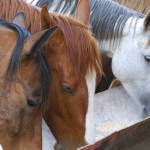Feeding the Horse Following Anterior Enteritis

Depending upon the severity of the disease, horses may have to receive nutrition parenterally (intravenously) during treatment. This is particularly true if a bout of anterior enteritis lasts longer than three or four days. Although glucose-rich intravenous fluids are a viable energy source for ill horses, the expense of parenteral nutrition often precludes its use in horses, and negative physiological effects, including atrophy of the intestinal mucosa, may make it an unfavorable treatment option.
Veterinary supervision of the horse during recovery is imperative. One of the most crucial aspects of aftercare is the use of a bland diet of small frequent meals. Gastrointestinal overload should be avoided due to the fragility of the digestive tract. A reversion to a more natural feeding system seems to be the soundest way to begin refeeding. Offering young, leafy grass first may be best because it is often the most palatable and digestible feedstuff for recovering horses. The inclusion of other forages, such as early-cut alfalfa hay and eventually grass hay, is then appropriate. On the recommendation of the veterinarian, grains or grain-based products may be re-introduced into the diet.
Because high-grain diets seem to be related, though circumstantially, to anterior enteritis, rations should be evaluated carefully. If a ration includes a large volume of grain, consideration should be given to alternative sources of energy that will allow less feed to be fed. Vegetable oils (corn, soy, canola, etc.) are highly digestible and can deliver calories to hardworking horses. Though less digestible, animal fats are also abundant in energy. High-fat stabilized rice bran can also boost the calorie content of a ration. Rice bran supplements should have a balanced calcium to phosphorus ratio. Rice bran is naturally rich in phosphorus, and when a product is not enriched with calcium, it may skew the mineral content of the entire diet.
Horses must be fed cautiously following gastrointestinal insult. By heeding the advice of a veterinarian, horses with anterior enteritis can eventually return to normal work. However, careful assessment of the feeding program may be prudent to ensure digestive health.








